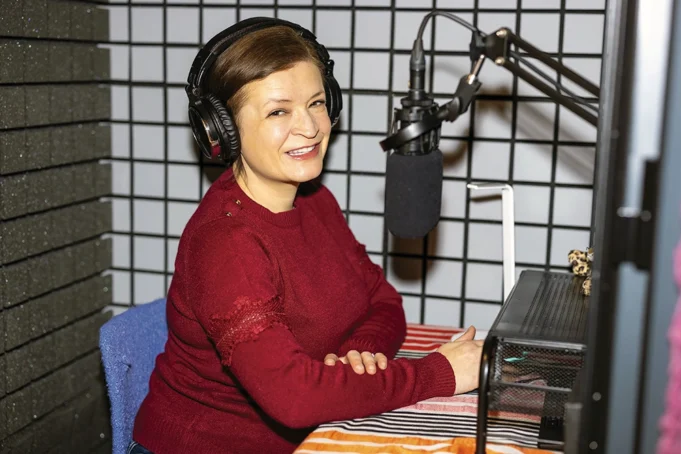By Valerie Hardy
Kristina Klemetti may be a familiar face around town, but her voice is one that is well-known worldwide. Klemetti, an Elmhurst-based audiobook narrator, has recorded approximately 400 books, including New York Times Bestseller “Carrie Soto Is Back” by acclaimed author Taylor Jenkins Reid.
However, while Klemetti’s voice may be recognizable to avid audiobook listeners, her name is likely one they have never heard. Klemetti records under two other names: one “that is all romance, and I don’t tell anyone that one,” Klemetti said with a laugh, and another, Stacy Gonzalez, which is primarily young adult and literary fiction.

While Klemetti’s given name reflects her Latin (Kristina) and Finnish (Klemetti) ancestry, she explained that her most prominent professional pseudonym combines her mother’s maiden name, Gonzalez, with a more “Anglo-sounding name, Stacy,” and was born out of a conversation with the coach she worked under after deciding to make the shift from stage acting to audiobook narration. “She knew my heritage, that my mother is from Colombia, and she said I should take advantage of the fact that I speak conversational Spanish,” Klemetti recalled.
There was a market for “somebody with my background and with my skill set,” Klemetti said, and there was “a movement in audiobooks for truth in casting.” For example, if there is a fictional character that is “half Latin, [publishers] want to find somebody who is half Latin to do the narration.”
When Klemetti began narrating under the name Stacy Gonzalez, she worried she might be exploiting her heritage in doing so. However, when those thoughts crept into her mind, Klemetti reminded herself, “My heritage is mine. It’s who I truly am… I should embrace it, enjoy it, and celebrate it.”
Klemetti found that others in the industry honored her Latin background as well, and after assuming her pseudonym in 2017, about six months after entering the audiobook narration field, she noticed an uptick in job offers. Today, she estimates about 70 percent of her work has some sort of Latin connection.
Two other factors contributed significantly to Klemetti’s career growth: her investment in an at-home recording booth and the shift of audiobook recording from studios in New York and Los Angeles to virtually anywhere as a result of the COVID-19 pandemic.
In 2019, Klemetti ordered from Spain the components to create an in-home recording studio. The package with the recording booth equipment arrived to her Elmhurst home on March 24, 2020. “When everybody pivoted to home recording, I could put my hat in the race with the legitimacy of a home studio, not just a closet where I recorded,” Klemetti said.
She has been busy recording ever since, narrating across genres: romance, young adult fantasy, nonfiction, and more.
Her favorite style to narrate in is “something called duet,” Klemetti explained. For example, in a novel with a female perspective and a male perspective represented, Klemetti would record all of the chapters from the female character’s point of view and the female dialogue in the male chapters, and the male narrator would record all of the chapters from the male character’s standpoint and the male dialogue in the female chapters.
Klemetti has a regimented approach to her narration process. She always reads the book before beginning recording. “I cast it in my head, with either famous people or people I know,” she said. “It’s helpful for me to have a vision of that person – what they look like, what they sound like.”
“If audiobook narration was just about a pretty voice, AI could do it.”
– Kristina Klemetti
If a publisher or author wants to consult directly with her or provides her with a manuscript with specific notes about the vision for the audiobook narration, she will consider those as part of her creative process. Klemetti approaches recording like a day job.
Once her 12-year-old son leaves for school, she spends weekdays in her recording booth, narrating an average of 20,000 words per day. A devoted wife, mother, and homeowner, Klemetti hangs up her headphones and moves away from the microphone in the evening and on the weekend in order to spend quality time with her family.
In addition to audiobook narration, Klemetti also does some commercial voiceover work, including for ComEd, Speedway, and Illinois Lottery. “The commercial stuff you go and record for an hour, but it’s ‘said it and forget it’ and on to the next project,” Klemetti said.
Audiobook narration, on the other hand, sticks with Klemetti because “it is an art,” and one in which she has proven highly skilled. Her narration of “Full Moon Over Freedom” by Angelina M. Lopez was named on the Best of 2023 list for “AudioFile Magazine.”
If you’re looking for a listen, check out Klemetti’s recently recorded “Anita de Monte Laughs Last” by Xochitl Gonzalez, which was released earlier this month.
“It has two story lines, one that’s in the late 1990s and one that’s in the 1970s, and my narration is the part in the 90s where a girl from a Latin background is going to Brown University as an art history major and one of the only people in that department that isn’t white,” Klemetti shared.
“She discovers an artist named Anita de Monte, whose story gets fleshed out in the 70s chapters, and her outlook changes on how we interpret art history – no longer from the white male gaze but through an understanding of Anita de Monte’s experiences and perspective.”
What’s next for Klemetti? She has already achieved one of her major professional goals – narrating a Taylor Jenkins Reid novel – but her bucket list continues to grow. She aspires to continue working with top publishing houses like Penguin/Random House, Simon & Schuster, and Macmillan. She would also “love to” narrate a Donna Tartt novel.
Klemetti is also committed to preserving the integrity of the audiobook narration industry. She adamantly opposes having artificial intelligence narrate audiobooks or the voices of narrators like herself used for AI purposes. “If audiobook narration was just about a pretty voice, AI could do it,” Klemetti said, “but it’s an emotional connection. It’s what you – a person with a soul – can do with it.” ■










